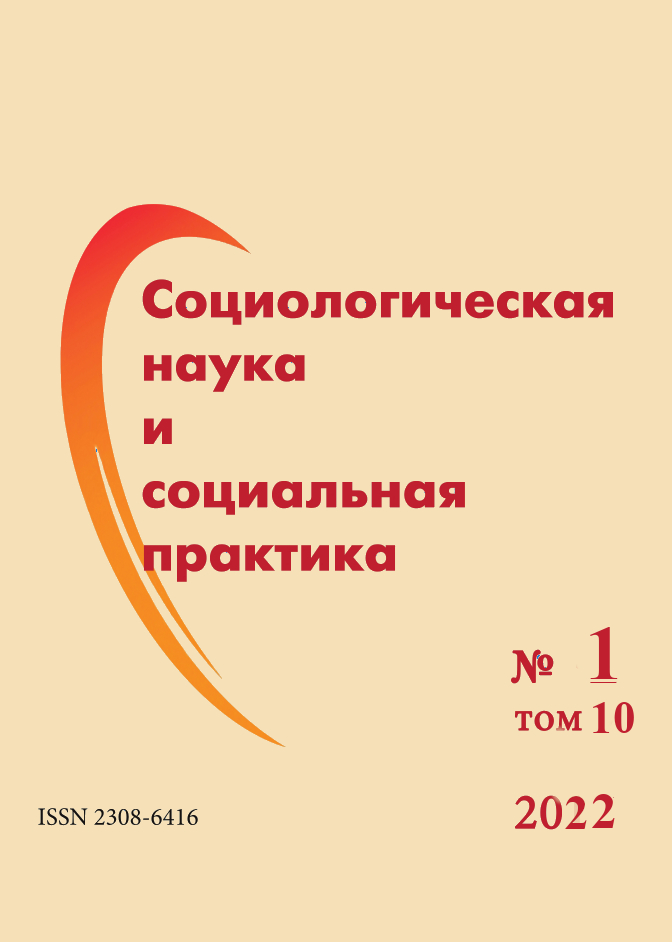Социальные представления российских школьниц о семье и раздельное по полу образование: полевое квазиэкспериментальное исследование
Научная статья
Аннотация
Литература
2. Антонов А. И. Социология семьи / А. И. Антонов, В. М. Медков. М. : Изд-во МГУ ; Изд-во ун-та бизнеса и управления («Братья Карич»), 1996. 304 c.
3. Берг Т. Н., Городилова Е. А. Удовлетворённость браком в семьях военнослужащих // Вестник морского университета. 2007. № 21. С. 137–143.
4. Бовина И. Б. Теория социальных представлений: история и современное развитие // Социологический журнал. 2010. № 3. С. 5–20.
5. Голод С. И. Состояние и перспективы развития семьи. Теоретико-типологический анализ. Эмпирическое обоснование / С. И. Голод, В. А. Клецин. СПб. : С.-Петерб. филиал Ин-та социологии РАН, 1994. 42 c.
6. Девятко И. Ф. Методы социологического исследования. Екатеринбург : Изд-во Урал. ун-та, 1998. 208 с.
7. Донцов А. И., Емельянова Т. П. Концепция социальных представлений в современной французской психологии // Вопросы психологии. 1984. № 1. С. 147–152.
8. Емельянова Т. П., Шмидт Д. А. Романтические отношения и брак в социальных представлениях поколений миллениалов и бэби-бумеров // Вестник Московского государственного областного университета. Серия: Психологические науки. 2019. № 1. С. 29–43. DOI: 10.18384/2310-7235-2019-1-29-43.
9. Ильин В. А., Свирин Д. В. Психосоциальное развитие высокостатусных, среднестатусных и низкостатусных военнослужащих срочной службы // Социальная психология и общество. 2018. Т. 9, № 1. С. 144–161. DOI: 10.17759/sps.2018090110.
10. Кэмпбелл Д. Модели экспериментов в социальной психологии и прикладных исследованиях / Сост. и общ. ред. М. И. Бобневой ; вступ. статья Г. М. Андреевой. М. : Прогресс, 1980. 392 с.
11. Локтаева С. А. Специфика проявления личностных свойств детей в семьях профессиональных военнослужащих. Автореф. дисс. ... канд. психол. наук. М., 2011. 26 с.
12. Психология субъективной семантики : истоки и развитие : [монография] / М. М. Абдуллаева [и др.]; под ред. И. Б. Ханиной, Д. А. Леонтьева. М. : Смысл, 2011. 471 с.
13. Раздельное обучение // Российская педагогическая энциклопедия. В 2-х т. / Гл. ред. В. В. Давыдов. Т. 2. М. : Большая российская энциклопедия, 1999. С 245–246.
14. Раздельное обучение: плюсы и минусы. Лекция И. С. Кона // Полит.ру: [сайт]. 18.11.2008 г. URL: https://polit.ru/article/2008/11/18/kon/ (дата обращения: 12.10.2020).
15. Солодников В. В. Семья и семейные группы: к уточнению понятий и перспектив исследования // Современная социальная психология: теоретические подходы и прикладные исследования. 2011. № 1(10). C. 43–56.
16. Солодников В. В., Солодникова И. В. Социальные представления молодёжи о семье в кросс-культурной перспективе // Вестник РГГУ. Серия «Психология. Педагогика. Образование». 2016. № 3 (5). С. 91–111.
17. Солодников В. В., Солодникова И. В. Идентичность личности и социальные представления о семье воспитанниц пансиона МО РФ // Традиции и инновации гражданского воспитания в современном образовательном пространстве. М. : Московский институт психоанализа ; Когито-Центр, 2019. С. 39–51.
18. Солодников В. В., Солодникова И. В. Социальные представления о семье воспитанниц пансиона Министерства обороны РФ и студенток: сравнительный анализ // Социальные процессы современной России / Под общ. ред. проф. З. Х. Саралиевой: В 2-х т. Т. 1. Н. Новгород : Изд-во НИСОЦ, 2020. С. 503–509.
19. Тихомирова Л. Ф., Макеева Т. В., Гурьянчик В. Н. Исследование социальных стереотипов феминности у обучающихся военных и гражданских вузов // Ярославский педагогический вестник. 2017. № 4. С. 35–41.
20. Троицкая Е. А. Влияние условий раздельного обучения на развитие эмпатии у школьников подросткового и юношеского возраста. Автореф. ... канд. психол. наук. М., 2012.
21. Швецова М. Н., Собченко М. Р. Образ семьи в представлениях поколения детей и родителей (поколения Y и Z) // Вестник Российского нового университета. Серия «Человек в современном мире». 2018. Вып. 2. С. 36–40. DOI: 10.25586/RNU.V925X.18.02.P.036.
22. Шмерлина И. А. Раздельное обучение в школах: преимущества и недостатки // ФОМ. База данных: [сайт]. 10.01.2008. URL: https://bd.fom.ru/report/map/d080124 (дата обращения: 15.10.2020).
23. Weigel D. J. The Concept of Family An Analysis of Laypeople’s Views of Family // Journal of Family Issues. 2008. Vol. 29. no. 11. pp. 1426–1447.
Поступила: 15.03.2021
Опубликована: 16.03.2022








 Издатель: Федеральное государственное бюджетное учреждение науки
Издатель: Федеральное государственное бюджетное учреждение науки